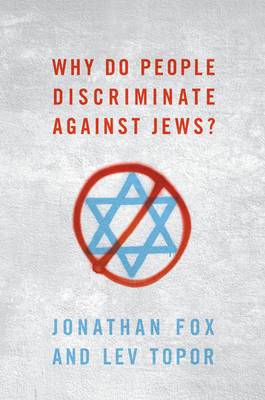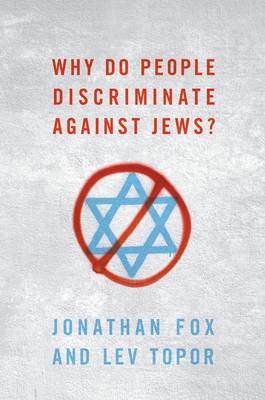
- Retrait gratuit dans votre magasin Club
- 7.000.000 titres dans notre catalogue
- Payer en toute sécurité
- Toujours un magasin près de chez vous
- Retrait gratuit dans votre magasin Club
- 7.000.0000 titres dans notre catalogue
- Payer en toute sécurité
- Toujours un magasin près de chez vous
126,95 €
+ 253 points
Format
Description
A novel analysis that combines traditional theories on anti-Semitism with evidence from 76 nations to explain the determinants that drive discrimination against Jews. Why Do People Discriminate against Jews? provides a data-rich analysis of the causes of discrimination against Jews across the globe. Using the tools of comparative political science, Jonathan Fox and Lev Topor examine the causes of both government-based and societal discrimination against Jews in 76 countries. As they stress, anti-Semitism is an attitude, but discrimination is an action. In examining anti-Jewish discrimination, they combine ideas and theories from classic studies of anti-Semitism with social science theories on the causes of discrimination. On the one hand, conspiracy theories, a major topic in the anti-Semitism literature, are relatively unexplored in the social science literature as a potential instigator of discrimination. On the other, social science theories developed to explain how governments justify discrimination against Muslims are rarely formally applied to the processes that lead to discrimination against Jews. Fox and Topor conclude by identifying three
potential causes of discrimination: religious causes, anti-Zionism, and belief in conspiracy theories about Jewish power and world domination. They conclude that while all three influence discrimination against Jews, belief in conspiracy theories is the strongest determinant. The most rigorous and geographically wide-ranging analysis of discrimination against Jews to date, this book reshapes our understanding of the persecution of religious minorities in general and the Jewish people in particular.
potential causes of discrimination: religious causes, anti-Zionism, and belief in conspiracy theories about Jewish power and world domination. They conclude that while all three influence discrimination against Jews, belief in conspiracy theories is the strongest determinant. The most rigorous and geographically wide-ranging analysis of discrimination against Jews to date, this book reshapes our understanding of the persecution of religious minorities in general and the Jewish people in particular.
Spécifications
Parties prenantes
- Auteur(s) :
- Editeur:
Contenu
- Nombre de pages :
- 252
- Langue:
- Anglais
Caractéristiques
- EAN:
- 9780197580349
- Date de parution :
- 01-07-21
- Format:
- Livre relié
- Format numérique:
- Genaaid
- Dimensions :
- 240 mm x 162 mm
- Poids :
- 499 g

Les avis
Nous publions uniquement les avis qui respectent les conditions requises. Consultez nos conditions pour les avis.






